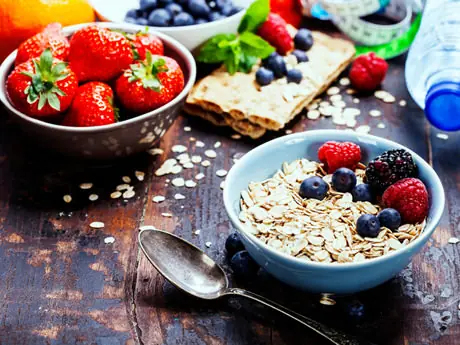
Regardless of weather you went out and did some #SELFIndulging or spent the evening winding down with some yoga before hitting the sack early, it's so important to start the day off with a balanced, healthy breakfast. You'll feel even better if you combine a few key nutrients with the right eats to reduce a bloated belly, damage from bad diet decisions and even nix puffy skin. To find out more, we tapped a couple nutrition experts to share tips to keep your digestive system humming from morning to night.
More: Foods That Fight Belly Fat
Take a Seat
Try to sit and eat before you leave the house in the morning—when you can. "Eating quickly or while you're walking does not allow your body prepare properly for digestion," says Lisa Moskovitz, RD, founder of New York Nutrition Group. "What you're left with is undigested large particles of food that stay in your digestive tract trapping air and water. This could result in serious bloating and discomfort before it's even time for lunch."
Up Your Hydration
First things first: flush away any of yesterday's dietary missteps or environmental toxins by drinking tons of water. "Right when you wake up, it is best to drink one or two cups of fluids," says Erin Morse RD, CNSC, Chief Clinical Dietitian at UCLA Health System. "Water with lemon, ginger tea and peppermint tea are great" at helping get things moving, she adds.
More: The New Rules of Hydration
Focus on Potassium
As far as intaking nutrients go, potassium is your BFF when it comes to slimming down, particularly so after a salty dinner the night prior. Foods like avocados, bananas, tomatoes and melon each have "Potassium helps balance out sodium levels in the body," says Morse. "Sodium makes us retain water, and potassium helps reduce water retention."
More: Why Sodium-Potassium Balance Is Critical for Better Hydration
Eat Fiber—But Not Too Much Fiber
Go ahead, eat lots of fiber—but there's a caveat. You must ease your way into eating this key nutrient, as your body won't be happy. "Aim for at least five grams of fiber, but not more than 10 grams unless your body is used to it," says Moskovitz. "Fiber helps promote healthy digestion, but when there's too much fiber at once, it can have the opposite effect and may worsen stomach irritability." Examples of foods that contain around five grams of fiber? One cup of blueberries, two slices of whole-wheat toast, one cup cooked oatmeal or one cup of whole-grain cereal.
- 1
- of
- 2
About the Author








Discuss This Article